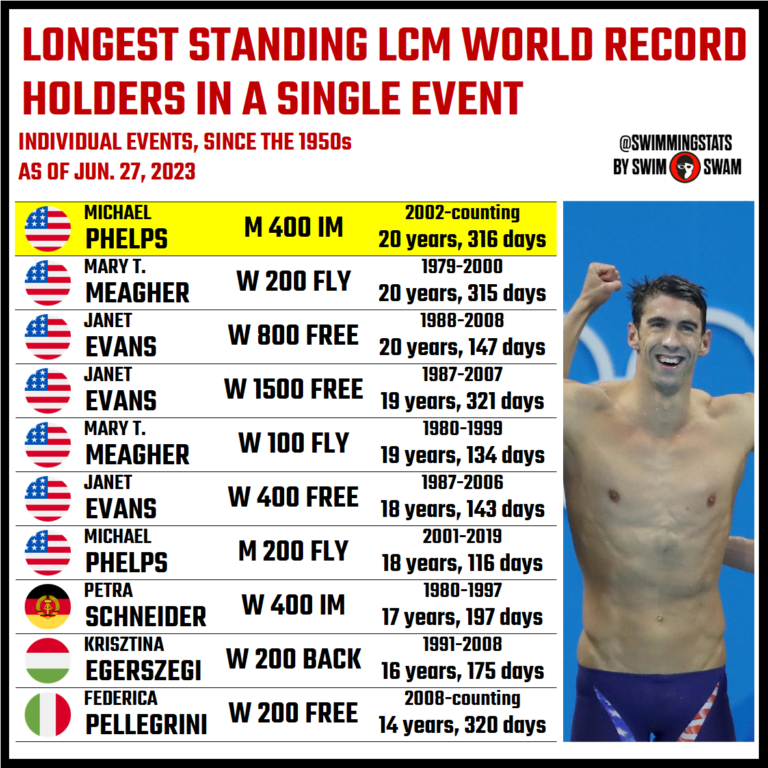
Swimming World Records: A Constant Pursuit of Excellence
The world of competitive swimming is a relentless pursuit of perfection, a constant striving to push the boundaries of human capability. Swimming world records, those coveted benchmarks of athletic achievement, are not static; they are fluid targets, constantly being challenged and, occasionally, shattered. This dynamic landscape reflects advancements in training techniques, technology, and the sheer dedication of athletes who dedicate their lives to mastering the water. This article delves into the fascinating world of swimming world records, exploring their history, the individuals who hold them, and the factors that contribute to their evolution.
A Brief History of Record-Breaking:
The formal recording and recognition of swimming world records began in the late 19th and early 20th centuries. Early records were often informal and varied depending on the governing body, leading to inconsistencies and disputes. The formation of international swimming federations, such as FINA (Fédération Internationale de Natation), brought standardization and legitimacy to record-keeping, establishing a clear framework for recognizing and validating achievements. The early years saw gradual improvements, often measured in seconds or even fractions of a second. Technological advancements, such as the introduction of more accurate timing mechanisms, played a role in this progression.
The mid-20th century witnessed a surge in record-breaking, fueled by advancements in training methodology and a greater understanding of sports science. The development of sophisticated training programs, incorporating elements like interval training, strength conditioning, and biomechanics analysis, allowed swimmers to push their physical limits further than ever before. This period also saw the rise of iconic figures like Mark Spitz, who famously won seven gold medals at the 1972 Munich Olympics, and East German swimmers, whose dominance was later attributed to the use of performance-enhancing drugs, highlighting a dark chapter in the sport’s history.
The latter half of the 20th century and the beginning of the 21st century saw a continued acceleration in record-breaking, driven by factors such as improved pool designs (faster, more hydrodynamic surfaces), technological innovations in swimwear (faster, more hydrodynamic suits), and the emergence of new training methods that focused on maximizing efficiency and minimizing drag. The use of high-tech suits, particularly in the late 2000s, sparked significant controversy and ultimately led to regulations aimed at limiting their impact on performance. The introduction of new materials and suit designs significantly impacted the records, leading to a period where numerous world records were broken.
Current Record Holders and Their Achievements:
The current holders of swimming world records represent the pinnacle of human achievement in the sport. Their dedication, discipline, and talent are undeniable. While listing every individual record would be exhaustive, highlighting some key figures and their accomplishments provides insight into the remarkable feats achieved:
-
Caeleb Dressel (USA): Dressel is widely considered one of the greatest sprinters in history, holding multiple world records in freestyle events. His explosive speed and technical mastery are evident in his performances. His records are a testament to his exceptional talent and rigorous training regime. He consistently pushes the boundaries of what’s possible in short-distance swimming.
-
Katie Ledecky (USA): Ledecky is a dominant force in middle and long-distance freestyle events. Her endurance, efficiency, and strategic race pacing are unmatched. Her world records showcase her extraordinary stamina and her ability to maintain a high pace over considerable distances. She is a true icon of distance swimming.
-
David Popovici (Romania): Popovici has emerged as a rising star in the world of sprinting. His remarkable speed and power have shattered existing records, signifying a new era in men’s sprint freestyle. He exemplifies the potential of young athletes to redefine the limits of human performance.
-
Sarah Sjöström (Sweden): Sjöström is a legendary figure in women’s sprint events, holding numerous world records in butterfly and freestyle. Her exceptional speed and technique have consistently placed her at the top of the sport. Her dedication to her training and her continuous improvement is an inspiration to aspiring swimmers.
These are just a few examples of the numerous athletes who currently hold world records. The list constantly evolves as athletes challenge and surpass each other’s achievements. The dedication and training required to reach this level of performance are immense, demanding years of commitment and sacrifice.
Factors Influencing Record Progression:
The continuous progression of swimming world records is a complex phenomenon influenced by several factors:
-
Training Methodology: Advancements in sports science and training techniques have revolutionized swimming training. Methods like interval training, strength and conditioning programs, and biomechanical analysis have allowed swimmers to optimize their performance and push their physical limits.
-
Technology and Equipment: Technological advancements, from faster pool surfaces to advanced swimsuits, have played a significant role in improving performance. While the impact of high-tech suits has been subject to regulation, other technological improvements continue to contribute to faster times.
-
Nutrition and Recovery: Proper nutrition and recovery strategies are crucial for optimizing athletic performance. Swimmers meticulously manage their diets and recovery protocols to maximize their potential.
-
Genetics and Talent: While training and technology are essential, inherent athletic talent and genetic predisposition play a significant role in achieving elite-level performance. Natural ability provides a foundation upon which dedicated training can build.
-
Competition and Motivation: The competitive environment in swimming fosters continuous improvement. The constant drive to surpass rivals and set new personal bests fuels athletes’ dedication and pushes the boundaries of performance.
The Future of Swimming World Records:
The future of swimming world records is uncertain but undoubtedly exciting. As training methodologies continue to evolve, technology advances, and new generations of talented athletes emerge, we can anticipate further improvements. The pursuit of excellence in swimming will continue, driven by the unwavering dedication and ambition of athletes who strive to etch their names in the history books.
The breaking of world records is a testament to the human spirit’s capacity for pushing boundaries and achieving seemingly impossible feats. It’s a captivating spectacle that draws millions of viewers worldwide and inspires aspiring athletes to pursue their dreams. The evolution of swimming world records is a dynamic story of dedication, innovation, and the never-ending quest for perfection in the world of competitive swimming. It’s a story that continues to unfold, with each record-breaking performance writing a new chapter.



